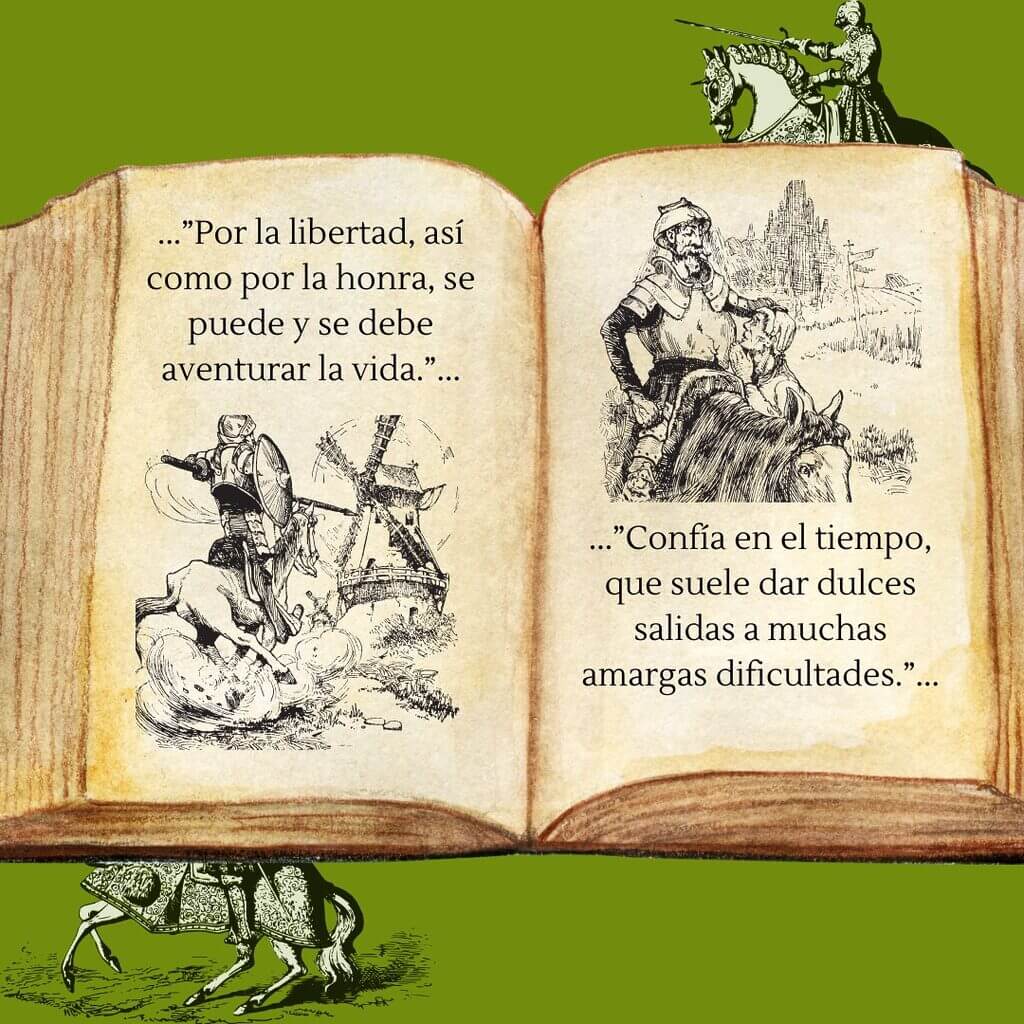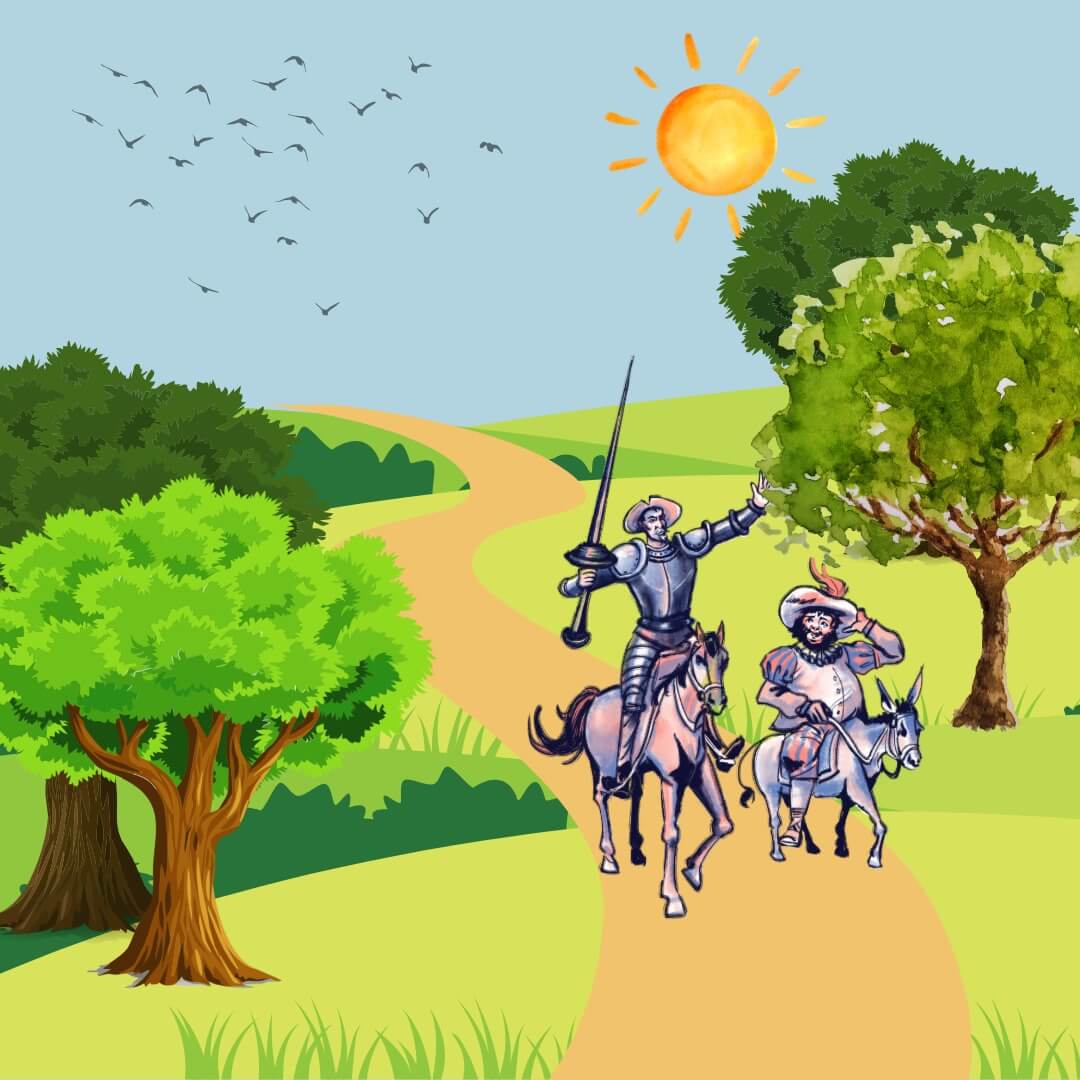Don Quixote de la Mancha, written by Miguel de Cervantes, is not only one of the crowning works of world literature but also a profound reflection on the human condition. Published in two parts (1605 and 1615), this novel has transcended its time to become a mirror of our struggles, dreams, and imperfections.
Let us explore the main themes that make this work an immortal classic.
1. Idealism vs. reality
The conflict between idealism and reality is the central axis of the novel. Don Quixote, a man from La Mancha obsessed with chivalric novels, decides to become a knight-errant to restore the values of justice, honor, and nobility in a world that no longer believes in them. However, his vision of the world is distorted: he sees giants where there are windmills, castles instead of inns, and noble ladies where there are common peasants.
On the other hand, Sancho Panza, his loyal squire, represents realism. With his common sense and pragmatism, he tries to moderate his master’s madness. However, even Sancho is swept up in dreams, such as his hope of governing an island promised by Don Quixote. This tension between idealism and reality invites reflection on the need to balance dreams with practical life.
2. The subjectivity of reality
Cervantes masterfully plays with the perception of reality. Don Quixote interprets the world according to his desires and readings, transforming reality into a stage for his knightly adventures. For example, the famous episode of the windmills is a demonstration of how his idealized vision distorts what actually happens.
This theme raises a key question: does an “absolute truth” exist, or does everything depend on perspective? Cervantes leaves it to the reader to decide whether Don Quixote is mad or if he simply chooses to see the world differently. This ambiguity has made the work a source of philosophical and psychological interpretations.
3. Friendship and loyalty
The relationship between Don Quixote and Sancho Panza is one of the most moving in literature. At first, Sancho accompanies his master out of self-interest, hoping to receive a material reward. However, over the course of their adventures, their relationship evolves into a friendship based on loyalty and mutual affection.
Sancho does not abandon Don Quixote even in his most absurd moments. Similarly, Don Quixote fully trusts Sancho, treating him as an equal despite their social differences. This relationship symbolizes the importance of loyalty and respect in friendship, even in the face of adversity.
4. Critique of chivalric novels
Don Quixote is, in large part, a satire of chivalric novels, a literary genre that had reached great popularity in previous centuries. Cervantes ridicules the unrealistic and exaggerated values of these stories through the adventures of his protagonist. However, the work also transcends this critique and offers a renewal of literary narrative
By parodying chivalric novels, Cervantes introduces psychological depth and narrative complexity that lay the foundation for modern novels. His work not only dismantles a genre but also creates something entirely new and revolutionary.
The work also explores the social tensions of Golden Age Spain. Through Sancho Panza, Cervantes portrays the aspirations of the lower classes and their struggle to ascend in a hierarchical system. Sancho’s dream of governing an island reflects these aspirations but also serves as a critique of the limitations imposed by the social system of the time.
For his part, Don Quixote represents a declining world. As a knight, he seeks to restore a feudal order that no longer fits in a more pragmatic and materialistic society. This tension between the old and the new is a recurring theme in the work.

6. Madness and sanity
Don Quixote’s madness is the driving force of the story. Without his delusions, there would be no adventures or philosophical reflections. However, Cervantes does not present this madness in a simple manner. Throughout the novel, there are moments when Don Quixote seems surprisingly sane, especially at the end when he renounces his knightly dreams.
This theme invites questioning what madness truly is. Is Don Quixote mad for pursuing his ideals, or are others the true mad ones for settling for a world devoid of nobility and dreams?
7. Identity and self-exploration
Throughout the novel, both Don Quixote and Sancho Panza evolve as characters. Don Quixote, though trapped in his fantasies, shows moments of self-awareness and reflection, especially in his deathbed. Sancho, on the other hand, goes from being an ingenuous peasant to a man with a more complex view of the world.
This evolution reflects the search for identity and meaning, themes that remain relevant in literature and life.
Conclusión
Don Quixote de la Mancha is much more than an adventure novel. It is a mirror of the human condition, an exploration of dreams and realities, of madness and sanity, of friendship and society. Through its universal themes, Cervantes invites us to reflect on what it means to be human and how we confront our own internal and external struggles.
Reading Don Quixote is not only diving into a masterpiece of literature but also embarking on a journey that, much like the knight of the sorrowful figure, confronts us with our own contradictions and aspirations.




